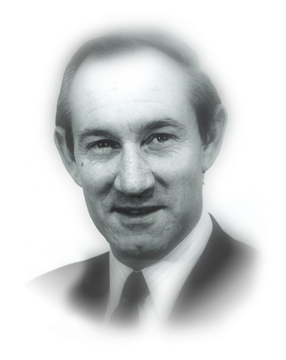HUNTER, Ronald
| Service Number: | S48401 |
|---|---|
| Enlisted: | 18 September 1941 |
| Last Rank: | Private |
| Last Unit: | Not yet discovered |
| Born: | Nailsworth, South Australia, 24 August 1922 |
| Home Town: | Blair Athol, Port Adelaide Enfield, South Australia |
| Schooling: | Blair Athol and Adelaide High School, South Australia |
| Occupation: | Not yet discovered |
| Died: | 16 June 2005, aged 82 years, cause of death not yet discovered, place of death not yet discovered |
| Cemetery: | Not yet discovered |
| Memorials: |
World War 2 Service
| 18 Sep 1941: | Involvement Private, S48401 | |
|---|---|---|
| 18 Sep 1941: | Enlisted Prospect, SA | |
| 18 Sep 1941: | Enlisted Australian Military Forces (WW2) , Private, S48401 |
Help us honour Ronald Hunter's service by contributing information, stories, and images so that they can be preserved for future generations.
Add my storyBiography contributed by Annette Summers
HUNTER Ronald MB BS FRCS FRACS
1922-2005
Ronald Hunter was born at Nailsworth on 24th August 1922. He was one of the five children of Frederick Hunter, a tram operator and former accountant, and Dulcie, nee Belcher. He had one brother, Stewart, a headmaster, and three sisters Betty, a microbiologist, Joy, a nurse assistant, and Mavis, a teacher’s aide. He was educated, at Nailsworth School, Blair Athol School and later at Adelaide High School. He excelled academically at Adelaide High School and gained university scholarships in both Leaving and Leaving Honours examinations. He had developed polio at the age of 14 and, as a consequence, spent a long time in hospital; this had a great influence on his subsequent choice of career in medicine. He, fortunately, did not have any residual effect of the polio infection. He continued to exhibit his academic ability while studying medicine at the University of Adelaide where he came top of each year and was awarded the Everard Scholarship when he graduated MB BS in 1944. He undertook his residency, in 1945, at the RAH, and, in 1946, at the ACH.
Hunter enlisted in the Army as a private soldier, like many of his university colleagues, in September 1941. On completion of his degree he joined the Australian Army Medical Corps. After initial training in Australia he served from 1946-1948 with the BCOF in 130 AGH in Japan. Here he served with his contemporaries Mervyn Smith, Bob Colton and Jim Bonnin. He was issued with the Australian Service medal 1945-1975 and wore the BCOF Japan medal.
Hunter returned to Adelaide in 1948 after 21 months in Japan. He married his fiancée, Molly Bennett, a nurse, and commenced training in surgery at the RAH as a surgical registrar. He then went to England to continue his surgical training at the Middlesex Hospital, London, gaining the FRCS in 1953 and later the FRACS. He returned to Australia and was appointed Honorary Clinical Assistant at the RAH, then Honorary Assistant Surgeon and later Honorary Surgeon from 1964 to 1970. He was a Senior Visiting Surgeon from 1971 to 1987. Hunter held numerous positions during his professional career; these included Chairman of the SA State committee of the RACS and a member of the Court of Examiners from 1973 to 1982. He was chairman of the Medical Staff Society of the Royal Adelaide Hospital from 1974 to 1975 and chairman of the department of General Surgery from 1979 to 1981. He chaired the Doctor’s Health Advisory Service from 1990 until 1999, and he was chairman of the Medical Committee and member of the Board of the Burnside War Memorial Hospital for five years from 1968-93. Burnside Hospital’s operating theatres were named the Ronald Hunter Operating Suite in consideration of his contribution to the hospital. Hunter was a general surgeon with wide ranging expertise; this was particularly so for parotid, thyroid and breast surgery. In addition, his expertise in hepato-biliary surgery saw him perform the first South Australian liver resection for a solitary metastasis and he was always referred the most difficult of biliary strictures.
He was a meticulous surgeon, operating in a methodical and unhurried manner. His opinion, expertise, advice and assistance were in great demand and greatly appreciated by his surgical colleagues. His quiet, unassuming manner, wry smile and dry sense of humour were always reassuring to patients, staff and trainees and the source of great admiration. Not given to the pursuit of academic output he nevertheless was a great teacher and his published papers included, The conservative surgical treatment of mixed tumours of the parotid, in the British Journal of Surgery, in 1954 and, in 1982, with Tony Williams, David Thomas and Mervyn Smith, Evaluation of an immunological test for occult bleeding from colorectal neoplasia. His recognition of the importance of screening for early colorectal cancer was instrumental in what is now the standard screening test for large bowel malignancy. Hunter played tennis and golf and was keen on sailing and snow skiing. Ronald Hunter died on 16th June 2005, aged 82. He is survived by his wife Molly, two sons and four daughters. His son, Andrew, is a talented colorectal surgeon and daughter, Dimity is a general practitioner in Victoria, Sally is a biologist, environmental policy officer and writer, Caro is a registered nurse, Jo is a kindergarten teacher and Ben is a mechanical engineer. Amongst his 16 grandchildren one is a physiotherapist, one is a dietitian and nutritionist with a PhD and one is studying Medicine. There are also four great grandchildren, three step grandchildren and five step great grandchildren.










